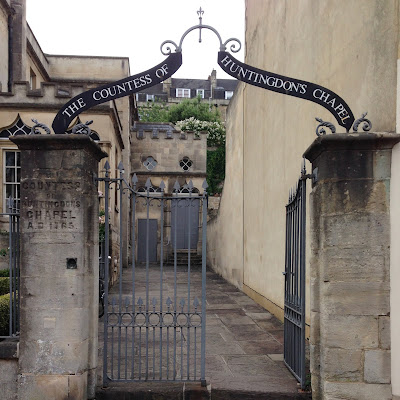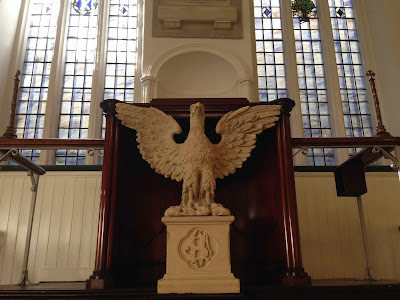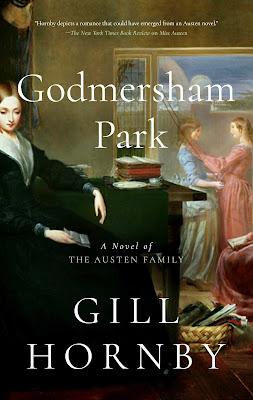Women as Religious Leaders in Austen’s England
Guest Post by Brenda S. Cox
All of Jane Austen’s clergy are men: Mr. Collins, Mr. Elton, Edmund Bertram, Edward Ferrars, Henry Tilney, and others. In Austen’s Church of England, only men could be ordained as clergy. But when I visited Bath a few years ago, I got to hear women preaching at both Bath Abbey and Christ Church. Women have only been ordained as Church of England priests since 1994 (though some other countries in the Anglican Communion began ordaining women earlier). In Jane Austen’s England, however, some women were already ministering in public ways.
The Countess of Huntingdon
I discovered the Countess of Huntingdon quite by accident as I was walking through Bath. Her lovely chapel is on the way to St. Swithin’s Church, where Austen’s parents were married. The Countess of Huntingdon’s Chapel, founded in 1765 (ten years before Austen’s birth), is now the Museum of Bath Architecture. But you can still see how the chapel was set up.
 |
| Caption: The Countess of Huntingdon built houses for herself in places like Bath, with large attached “private” chapels, open to the public. © Brenda S. Cox 2022 |
The Countess became a Methodist in the 1700s, when Methodist revivals were sweeping England. At that time, Methodists were trying to bring new life into the Church of England. They separated from it by the end of the 1700s. Most of their followers were from the lower and middle classes, but the Countess of Huntingdon, of course, was from the nobility. She did not preach, but was a powerful church leader, always looking for new ways to spread the gospel message.
The Countess hosted “spiritual routs,” parties where Methodist ministers preached, in her London home to bring the gospel message to her peers. She held separate meetings for poorer people. However, that was not enough for her.
Methodist ministers, although ordained in the Church of England, were having difficulty finding places to preach. Their “enthusiastic,” or emotional, style of preaching, and their message of salvation by faith alone, were not popular among other clergy. So the Countess came up with an ingenious solution. As a noblewoman, she could have a private chapel attached to her home (as the Rushworths have in Mansfield Park). She could also hire private chaplains, and get them ordained if necessary. So she built homes for herself all over England, with large chapels attached to them. (She was not as wealthy as you might think; she had to sell her jewels to build the first chapel, and she raised money for the others.) She chose chaplains from among the Methodist preachers, including the famous preacher George Whitefield. Then she invited those chaplains and other Methodists ministers to preach in her chapels around the country.
 |
| Caption: Methodist preachers, including George Whitefield, took turns preaching at this pulpit in the Countess of Huntingdon’s Chapel in Bath. © Brenda S. Cox 2022 |
The Countess also started her own seminary to train clergymen, after Oxford University refused to ordain several “methodistical” students.
However, when she built a chapel in London at Spa Fields, the local clergyman sued her and won. At that point she had to separate from the Church of England. But her services were still essentially Anglican services. The Countess of Huntingdon “Connexion” is still operating, listing 22 chapels in England and more than 30 chapels in Sierra Leone.
The Countess was sometimes as imperious as Lady Catherine de Bourgh, and her work was often controversial. But she was a church leader, with a heart for God, who influenced many people.
Hannah More
Hannah More was another woman of Austen’s time who influenced many toward deeper religious faith and moral behavior. She was from a very different strata of society, the daughter of a middle-class schoolmaster. However, with her wit and intelligence, she made friends with influential people, especially Samuel Johnson (author of the first major English dictionary), David Garrick (famous actor), and William Wilberforce (leader of the abolition movement). She became part of the “Clapham Sect,” a group of Christians who led the fight against slavery and the slave trade.
More wrote many books, which were far more popular than Austen’s at the time. They don’t appeal to us much today, though. One of Austen’s reviewers called More’s only novel, Coelebs in Search of a Wife, a “dramatic sermon”; he praised Austen for her less obtrusive religious approach. (This novel is mentioned in Austen’s letters of Jan. 24 and Jan. 30, 1809; Cassandra recommended it to Jane.) Many of More’s other books confronted the immoral behavior of the upper classes. However, the upper and middle classes still loved her books. In a letter, Austen mentions some of her friends reading More’s latest production (May 31, 1811).
Hannah More and her sister also started and supported Sunday schools throughout the impoverished region of Cheddar, where they lived. These schools gave a basic education to poor people, both children and adults, teaching them reading and other skills that enabled them to improve their lives. More also wrote popular tracts which were sold cheaply to the working classes to give them what was considered good reading material.
 |
| Hannah More published dozens of books, but only one novel: Coelebs in Search of a Wife: Comprising Observations on Domestic Habits and Manners, Religion and Morals. Because of its title, Austen asked, “Is it written only to Classical Scholars?” But it was wildly popular, in the UK and the US. First published in 1808, it was already in its 11th edition in 1809. |
Other Denominations
The Methodist leader, John Wesley, allowed women to preach if they felt they had an “extraordinary call” from God. He told one of them, “Sister, do all the good you can.” Later on, when women preachers were visiting a congregation, Methodists often listed them by their husbands’ names, with an asterisk to show that the wife would be preaching!
The Quakers were the most egalitarian religious group of the time. They did not ordain ministers, but officially “recorded” those with a recognized gift of spoken ministry. Some of these were women. Elizabeth Fry, who led the fight for prison reform in England, was a Quaker minister.
You can read much more of these women’s stories, and much more, in Fashionable Goodness: Christianity in Jane Austen’s England, now available from Amazon and Jane Austen Books.
Purchase Links
FTC Disclaimer: Link to Amazon (paid link). I am an Amazon Associate. I will receive a small commission if you purchase a book through the link provided. Thanks!
Recommendations:
“Finally! Fashionable Goodness is the Jane Austen reference book that’s been missing from the bookshelves of every Austen fan and scholar.”
~ Rachel Dodge, bestselling author of Praying with Jane
“You will look at Mr. Collins, the Crawfords, the Dashwoods, the Tilneys, the Wickhams, and Willoughbys--and especially Fanny Price!--with new and surprising insights. Bravo to Brenda Cox for giving us this very accessible, illuminating take on the ‘fashionable goodness’ of Austen’s era!”
~ Deborah Barnum, Jane Austen in Vermont
“Brenda Cox’s Fashionable Goodness: Christianity in Jane Austen’s England is an indispensable guide to all things religious in Jane Austen’s world.”
~ Roger E. Moore, Vanderbilt University, author of Jane Austen and the Reformation
“This scholarly, detailed work is a triumph. Easily read, helpful and accurate, it provides a fascinating panorama of 18th century Anglicanism and the various challenges the Church and wider society faced. Cox’s many insights will enrich readers’ understanding and appreciation of Jane Austen’s novels and her life as a devout Christian.”
~ The Revd. Canon Michael Kenning, vice-chairman of the Jane Austen Society (U. K.) and former rector of Steventon
About the Author
Brenda S. Cox has loved Jane Austen since she came across a copy of Emma as a young adult; she went out and bought a whole set of the novels as soon as she finished it! She has spent years researching the church in Austen’s England, visiting English churches and reading hundreds of books and articles, including many written by Austen’s contemporaries. She speaks at Jane Austen Society of North America meetings (incuding three AGMs) and writes for Persuasions On-Line (JASNA journal) and the websites Jane Austen’s World and Faith, Science, Joy, and Jane Austen.
Blog Tour
Oct. 21 My Jane Austen Book Club, Maria Grazia, Giveaway and Guest Post, “Sydney Smith, Anglican Clergyman and Proponent of Catholic Rights, Potential Model for Henry Tilney” Oct. 27 Australasian Christian Writers, Donna Fletcher Crow, Guest Post, “Seven Things Historical Fiction Writers Should Know about the Church of England” Nov. 2 Austen Variations, Shannon Winslow, Interview, Excerpt from Chapter 7, “The Clergyman’s Wife” Nov. 8 Julie Klassen, Book Review and Guest Post, “Jane Austen at Church”
Thank you Brenda! That was fascinating. Your book looks like a excellent reference book. Congratulations on its release!
So, friends, what are your thoughts? Please feel free to leave any comments or questions below.

.jpg)


















